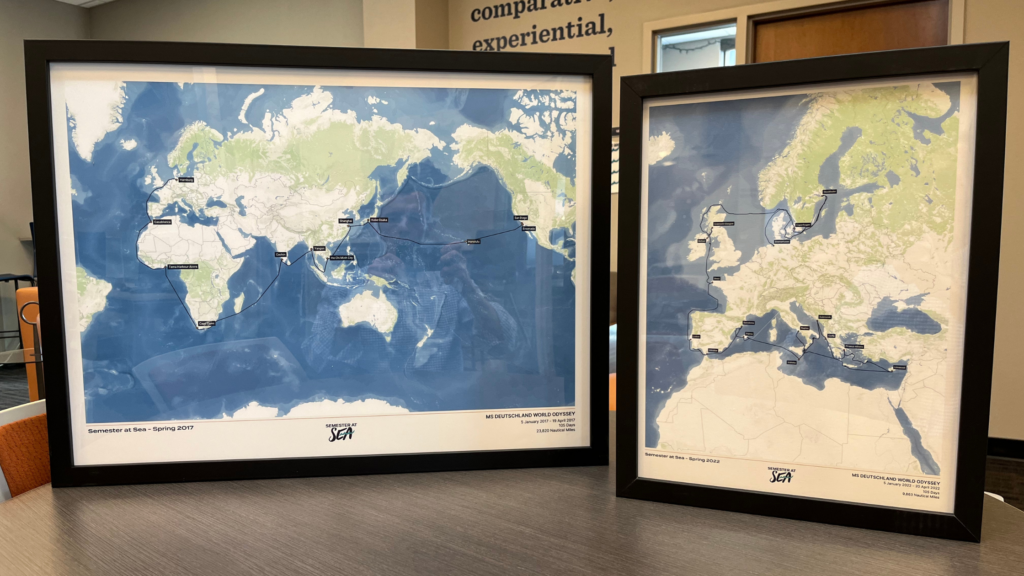How to budget for expenses studying abroad

Studying abroad is one of those once-in-a-lifetime experiences. For many, it might be their first time traveling out of the country and truly immersing themselves in another culture. This opportunity is invaluable and can truly set college students up for great success in years to come.
When borders finally reopened after the pandemic, applications to study abroad programs skyrocketed; the number of U.S. students studying overseas in 2022-23 increased by 83% compared to the previous academic year, according to data from Opendoors .
During college, it was important for me to study abroad. I chose a program at the University of New South Wales in Australia (near the beaches in Sydney), and I look back fondly at that experience quite often.
Unfortunately, though, the study abroad experience comes with a hefty price tag. According to a recent Study.com survey, the average cost to study aboard for a semester costs $16,368 in 2023.
These costs are generally above and beyond what parents think college students spend. Of course, this number can be higher or lower depending on your specific program, the country where you are studying and other external factors, but this is a good number to start with.
For me, the cost of studying abroad was actually similar to the semester cost at my university in the U.S. Finding a program that partners with your university is important as it will make the process more seamless and potentially more financially feasible.
Related: How to travel on a budget: Here are our 22 top tips
With such an expensive cost, it is a good idea to start budgeting early. You'll also want to remember studying abroad is more than just tuition, housing and a plane ticket to that country. You truly want it to be an experience. You'll want to eat at local restaurants, travel around the country and spend nights out in the town.
Here are some tips on how to budget for your upcoming study abroad experience:

Plan out your expenses
Aside from your program costs, there are many additional expenses that you might not have thought about. Since you are in another country, you might have to get a different cellphone and sign up for a separate plan. You also might be on the hook to pay for Wi-Fi and electricity in your accommodation.
Related: Every student studying abroad needs one of these credit cards
Transportation to your school is another cost to think about. Are you within walking distance, or will you be relying on local transportation? Also, consider how you'll get to the grocery store and around town. The costs will be minimal for some, while others might have a decent line item in their budgeting tracker.
This is something that I did not consider initially. My school was about a 20-minute walk, but for late-night classes, I didn't love walking on my own in the dark. The grocery store was also close to the school, so walking with bags in hand (with many hills) was not a great option. Every time I took the bus, I was out another $2. While this might not seem like a lot, it can add up, especially if you pay this on a daily basis.

Your housing situation will also play a big part in your additional expenses. Are you living on a campus with an included meal plan, or are you on your own for food? Do you have a kitchen where you can cook your own food, or will you primarily be eating out?
I lived in a house with seven other students and was fortunate enough that we would all take turns cooking for one another. Cooking in bulk and splitting trips to the grocery store helped keep us on track with our budget.
Using an excel spreadsheet or creating a monthly budget can help you fully keep track of your potential expenses and help you spend accordingly.
Pick a budget-friendly country
When you are budgeting out all of your expenses, make sure to take your country of choice into account. For example, studying in Western Europe will likely cost more than in Southeast Asia. This is not only due to potentially lower program costs but also your everyday living expenses, entertainment and travel costs. Finding street food for a dollar is quite easy in Thailand, but it's nowhere close to realistic in Switzerland.

Understanding personal finance and ways to manage money early on is important when preparing to study abroad. Using a general study abroad cost calculator might over or underestimate your actual costs, so make sure to fully understand the overall climate of your country of choice.
You'll also want to consider exchange rate changes. If you are budgeting a year or more out, remember that the exchange rate might be slightly different after you actually arrive in the country. This may or may not be to your advantage. Hint: You could use a no foreign transaction fee card to pay for your expenses.
Know what's included in your program costs
Figure out what's included in your program costs, as you might be surprised to see the additional costs add up. Is the flight to the country included? (If not, you can always consider using points and miles to get you there.) Will you have to furnish your apartment or housing option, or will it already be furnished?
When I studied abroad, although our apartment was furnished, we were on the hook for nonessentials, like televisions. We went to a secondhand store to buy a television for the semester, and then we sold it at the end of our six-month stay. We also had to rent a washing machine from a local store and opted to hang dry our clothes to save on the dryer expense. These were not expenses I had originally budgeted, but they can add up.
Determine the cost of living

Do some research about the country you are planning to visit to figure out the cost of living. Talk to students who have studied at that particular school or join a local online group and speak to individuals currently living there.
This will help you determine essential costs, such as housing, cell phones, transportation, restaurants and groceries. Of course, you'll also want to budget for experiences as well, such as restaurants, excursions and nightly entertainment.
You will want to travel
Travel is a huge part of studying abroad too. While getting to know your new university and the city where you are living is great, seeing other parts of the country is part of the experience.
The place you're studying will determine your travel expenses. You'll want to determine if there are inexpensive train options or if you are bound to more expensive airplane tickets.
During my study abroad experience, we were pretty much on our own for sightseeing. One weekend trip, a visit to the Blue Mountains of Australia, was included in the program fee. My other travel and sightseeing expenses during the study abroad experience made up a hefty part of my budget.
Fortunately, I knew other students who went to my university of choice the year prior, and they were able to help me figure out my travel schedule in advance. My research ahead of time helped me understand to budget for a spring break trip and a week-long study period trip at the end of the semester.
I also planned a few weekend trips to see other sites within the country. Staying with friends while traveling is also a great way to reduce travel costs and help you stay on budget.

Bottom line
Studying abroad is an amazing experience and should be an opportunity to consider. The cost can add up, but some students might actually find it to be a similar price as their semester cost at home.
Ultimately, you'll want to ensure you budget properly to fully enjoy the entire experience out of the country. Make sure to live like a local, see everything you can and make the most memories to look back on.
Related reading :
- The best credit cards for college students
- 10 ways college students can meet credit card minimum spending requirements
- My experience of getting my first student credit card — and which credit card I want next
- College students: How to use your credit card responsibly
- Credit cards
- View all credit cards
- Banking guide
- Loans guide
- Insurance guide
- Personal finance
- View all personal finance
- Small business
- Small business guide
- View all taxes
You’re our first priority. Every time.
We believe everyone should be able to make financial decisions with confidence. And while our site doesn’t feature every company or financial product available on the market, we’re proud that the guidance we offer, the information we provide and the tools we create are objective, independent, straightforward — and free.
So how do we make money? Our partners compensate us. This may influence which products we review and write about (and where those products appear on the site), but it in no way affects our recommendations or advice, which are grounded in thousands of hours of research. Our partners cannot pay us to guarantee favorable reviews of their products or services. Here is a list of our partners .
How To Pay for Study Abroad

Many or all of the products featured here are from our partners who compensate us. This influences which products we write about and where and how the product appears on a page. However, this does not influence our evaluations. Our opinions are our own. Here is a list of our partners and here's how we make money .
Studying abroad in college is a unique opportunity to expand your horizons, build valuable skills and prepare for the global workforce — and it might be more affordable than you think.
An exchange program offered by your U.S. university could be the easiest and most affordable route, since your school will already know how to process your financial aid for these programs. For many U.S. students, study abroad costs can be comparable to those of your home university, thanks to scholarships, student loans and other types of financial aid.
Though there are many ways to pay for study abroad, it’s best to minimize the amount of money you borrow. Here are the top ways to pay.
» MORE: How to study abroad in college
Student loans from our partners

on Sallie Mae
4.5% - 15.49%
Mid-600's
on College Ave
College Ave
4.07% - 15.48%
4.09% - 15.66%
Low-Mid 600s
12.9% - 14.89%

13.74% - 15.01%

5.24% - 9.99%
5.49% - 12.18%

on Splash Financial
Splash Financial
6.64% - 8.95%
4.07% - 14.49%
5.09% - 14.76%
4.11% - 14.3%

6.5% - 14.83%
Apply for study abroad scholarships
Consider applying for scholarships and grants, which are a type of “gift aid” you won’t need to pay back. The State Department’s USA StudyAbroad website lists dozens of study abroad scholarships offered by both the U.S. and foreign governments. Your home institution’s study abroad office may also have a list of suggested scholarships.
You can typically use the need-based Pell Grant to pay for study abroad, as long as your program takes place during a standard academic term. Undergraduate students who receive Pell Grants can also apply to the State Department’s Benjamin A. Gilman International Scholarship . It awards students up to $5,000 to pay for study abroad, or up to $8,000 if they study a “critical need” language while abroad.
» MORE: Not sure where to study abroad? Explore the top destinations for U.S. students
Explore institutional aid
Your U.S. college might offer special loans and grants to help students study abroad.
For example, Syracuse University distributes short-term loans to students with financial need to cover the cost of a plane ticket to their program, which students repay without added interest once financial aid funds hit their bank accounts. The University of Wisconsin-Madison awards scholarships of up to $5,000 to its students who participate in semester-long study abroad programs.
Check with your study abroad office for more information.
» MORE: Can college abroad actually save you money?
Check 529 account rules for study abroad
If your parents contributed to a 529 college savings account , you may be able to use those funds for study abroad. Generally, you can use 529 money to cover standard expenses like tuition, program fees, housing and textbooks when studying abroad. Additional costs like transportation, international health insurance, weekend travel and basic daily living expenses aren’t eligible for 529 funds.
529 withdrawal rules vary by state. If you use 529 funds for non-qualified study abroad expenses, you'll have to pay taxes and a 10% penalty on the earnings.
» MORE: Is studying abroad worth it?
Pull from your savings
If you have remaining costs after scholarships and other gift aid, consider tapping your savings before turning to student loans, which you’ll have to pay back with interest.
You can get creative to build out your savings account before you study abroad. Ask relatives to contribute to a study abroad fund instead of giving you holiday gifts, and thank them for their support. Hold a carwash or yard sale. Get a part-time job over the summer. Request your sibling pay you for use of your car while you’re gone.
» MORE: 25 ways to make money online, offline and at home
Use federal student loans
If you’re eligible to receive federal financial aid at your U.S. university, you may be able to use it for study abroad. That includes all types of federal student loans . If your study abroad program is more expensive than your home university, you may also be able to request a larger financial aid package through your financial aid office.
Your college will process your study abroad financial aid, so federal student loans are typically available only for exchange programs or other study abroad programs sponsored by your university. Check with your study abroad or financial aid office if you have any questions.
You must submit the Free Application for Federal Financial Aid ( FAFSA ) in order to qualify for loans and grants from the government.
Consider private student loans
If you have exhausted all other funding options, private student loans can help you fill in gaps. Lenders like College Ave and Sallie Mae offer student loans that can be used for study abroad.
» MORE: Federal vs. private student loans
Private loans should be a last resort. They don’t typically offer the same protections and perks as federal student loans, like loan forgiveness programs or monthly payments capped at a certain percentage of your income.
On a similar note...

Average cost of studying abroad
Advertiser disclosure.
We are an independent, advertising-supported comparison service. Our goal is to help you make smarter financial decisions by providing you with interactive tools and financial calculators, publishing original and objective content, by enabling you to conduct research and compare information for free - so that you can make financial decisions with confidence.
Bankrate has partnerships with issuers including, but not limited to, American Express, Bank of America, Capital One, Chase, Citi and Discover.
How We Make Money
The offers that appear on this site are from companies that compensate us. This compensation may impact how and where products appear on this site, including, for example, the order in which they may appear within the listing categories, except where prohibited by law for our mortgage, home equity and other home lending products. But this compensation does not influence the information we publish, or the reviews that you see on this site. We do not include the universe of companies or financial offers that may be available to you.
- Share this article on Facebook Facebook
- Share this article on Twitter Twitter
- Share this article on LinkedIn Linkedin
- Share this article via email Email

- • Personal loans
- • Debt management
- Connect with Hanneh Bareham on Twitter Twitter
- Connect with Hanneh Bareham on LinkedIn Linkedin
- Get in contact with Hanneh Bareham via Email Email

- • Personal finance
- • Debt relief
- Connect with Aylea Wilkins on LinkedIn Linkedin
The Bankrate promise
At Bankrate we strive to help you make smarter financial decisions. While we adhere to strict editorial integrity , this post may contain references to products from our partners. Here's an explanation for how we make money .
Founded in 1976, Bankrate has a long track record of helping people make smart financial choices. We’ve maintained this reputation for over four decades by demystifying the financial decision-making process and giving people confidence in which actions to take next.
Bankrate follows a strict editorial policy , so you can trust that we’re putting your interests first. All of our content is authored by highly qualified professionals and edited by subject matter experts , who ensure everything we publish is objective, accurate and trustworthy.
Our loans reporters and editors focus on the points consumers care about most — the different types of lending options, the best rates, the best lenders, how to pay off debt and more — so you can feel confident when investing your money.
Editorial integrity
Bankrate follows a strict editorial policy , so you can trust that we’re putting your interests first. Our award-winning editors and reporters create honest and accurate content to help you make the right financial decisions.
Key Principles
We value your trust. Our mission is to provide readers with accurate and unbiased information, and we have editorial standards in place to ensure that happens. Our editors and reporters thoroughly fact-check editorial content to ensure the information you’re reading is accurate. We maintain a firewall between our advertisers and our editorial team. Our editorial team does not receive direct compensation from our advertisers.
Editorial Independence
Bankrate’s editorial team writes on behalf of YOU – the reader. Our goal is to give you the best advice to help you make smart personal finance decisions. We follow strict guidelines to ensure that our editorial content is not influenced by advertisers. Our editorial team receives no direct compensation from advertisers, and our content is thoroughly fact-checked to ensure accuracy. So, whether you’re reading an article or a review, you can trust that you’re getting credible and dependable information.
How we make money
You have money questions. Bankrate has answers. Our experts have been helping you master your money for over four decades. We continually strive to provide consumers with the expert advice and tools needed to succeed throughout life’s financial journey.
Bankrate follows a strict editorial policy , so you can trust that our content is honest and accurate. Our award-winning editors and reporters create honest and accurate content to help you make the right financial decisions. The content created by our editorial staff is objective, factual, and not influenced by our advertisers.
We’re transparent about how we are able to bring quality content, competitive rates, and useful tools to you by explaining how we make money.
Bankrate.com is an independent, advertising-supported publisher and comparison service. We are compensated in exchange for placement of sponsored products and, services, or by you clicking on certain links posted on our site. Therefore, this compensation may impact how, where and in what order products appear within listing categories, except where prohibited by law for our mortgage, home equity and other home lending products. Other factors, such as our own proprietary website rules and whether a product is offered in your area or at your self-selected credit score range can also impact how and where products appear on this site. While we strive to provide a wide range offers, Bankrate does not include information about every financial or credit product or service.
martin-dm/Getty Images Though study abroad participation dropped sharply during the COVID-19 pandemic, there has been a strong rebound in both American students studying abroad as well as international students returning to the U.S.
Most undergrads do a study abroad program in their junior year, but these days you can find programs that are a good fit no matter where you are in your undergraduate experience. If you’re considering one of these programs, it’s best to start planning early to find the right fit for your academic needs and interests and budget for any extra expenses.
Study abroad statistics
- In 2018-19, 347,099 students participated in study abroad . That was up 2.3 percent from the previous year.
- 27 percent of study abroad students are in their junior year, while more than 33 percent are in their senior year.
- Around two-thirds of study abroad students are women.
- Many study abroad programs are based on your usual tuition costs, but there may be several thousands of dollars in expenses added on top.
How much a study abroad program costs depends on a wide range of factors, from what the baseline education costs are in a particular country to what the study abroad program itself includes. The University of Louisville estimates that a semester-long study abroad program averages around $7,000 to $15,000.
The cost of studying abroad doesn’t just include tuition; you’ll also need to factor in flights and other transportation, meals, health insurance, class materials and any souvineers you want. Below is a sampling of estimated fees from a variety of programs.
Cost of study abroad by region/country
The most popular destinations for study abroad are Italy, Spain, the United Kingdom, France and South Korea. However, some of these destinations are also among the most expensive. Research finds that Australia is the most expensive country to study in based on annual university costs and annual cost of living, while the United Kingdom and France are not far behind.
Cost of study abroad by program/agency
A thriving ecosystem of companies organize study abroad opportunities for students. Many of these are nonprofits that partner with a broad range of universities and colleges to offer for-credit courses. They are often the link between an American university and an international university, and they frequently augment the coursework with excursions and events.
Here’s a snapshot of some of the most popular organizations and how they stack up.
How to pay for study abroad
If you’re considering study abroad, make budgeting a part of your planning process from the very beginning. Studying abroad is expensive, but it is also entirely doable if you keep the numbers on track from the get-go. Be realistic about what your costs will be in a given location and know the ins and outs of what the different program options include. And don’t forget to squirrel away a bit of cash for souvenirs.
The good news is that much of your existing financial aid can be used for study abroad costs. You may be able to use:
- Student loans.
- College scholarships.
In addition to your existing aid, there are many scholarships targeted specifically at students studying abroad, which you can uncover using a scholarship search engine . Third-party companies that facilitate study abroad programs also often have their own scholarships.
Once you’re at your destination, look for any discounts that can defray your costs. For example, many major cities offer student discounts to museums and national landmarks.
Is it reasonable to go on study abroad if you have student loans?
Many study abroad programs are eligible to be paid using student loans. Whether the decision to pursue study abroad makes financial sense to you will depend on the program you choose, how expensive it is, and how much value it may add to your degree. If you are studying a foreign language, art history, or international affairs, for instance, a study abroad trip may contribute positively to your employment prospects upon graduation.
At the same time, not all study abroad programs are created equally. Some may cost far above what a regular semester at your home university does, and depending on your student debt burden, borrowing to cover costs may not be a wise choice.
Consult with your university’s financial aid office and study abroad offices for other considerations you should weigh before planning a trip. With federal student loans due to enter repayment later this year, it is wise to be realistic about the monthly expenses you will be able to afford upon graduation.
The bottom line
A study abroad program can be a rich opportunity to pursue your education and experience another culture at the same time. While some opportunities will exceed the cost of your regular tuition, room, and board, others may be attainable at a comparable cost. Connect with your university to explore the programs available and weigh the possibilities.
Frequently asked questions
What is study abroad, what are the requirements to study abroad.
- Photo ID (driver’s license or passport photo).
- Academic transcript.
- Proof of secondary education, like a GED or high school diploma (if applying as a freshman).
- Program admission test results, like GRE results (if applying for a graduate program).
What country is best for studying abroad?

What is the ROI of your college degree?
- Admitted Students
- Lifelong Learners
- Advisors & Faculty
- Spring 2024
- Spring 2025
- Past Voyages
- Why Semester at Sea?
- Global Citizenship
- Frequently Offered Courses
- Co-Curricular
- Packing List
- Field Programs
- Plan Your Own Travel
- Student Stories
- Global Ambassadors
- Shipboard Resources
- Identity Abroad
- Diversity Peer Mentor Program
- How We Stay Safe
- Health & Safety At Sea
- Health & Safety On Land
- Coronavirus / COVID-19
- Undergraduate
- Recent College Graduate
- Credit Transfer
- The College Tour
- Contact Admissions
- Cost Calculator
- Program Cost
- Scholarships & Grants
- Funding Options
- Federal Aid Loans
- Payment Policy
- Sustainability
- Board of Trustees
- Work With Us
- Request Info
- Finances & Budgeting
The Cost of Studying Abroad: Everything You Need To Know

On This Page
- Share on Twitter
- Share on Facebook
- Share on LinkedIn
Studying abroad is an unforgettable experience that’s impossible to put a price tag on — but for some, that price tag can be a barrier to experiencing it for themselves.
Cost is the most common reason students choose not to study abroad during college or a gap year. The price of a semester abroad varies widely based on the type of program, destination, and what’s included in the experience, but the average cost of a study abroad program is $16,368 , according to analysis by Study.com . U.S. colleges that organize their own semesters abroad price them in accordance with their own tuition prices — meaning that there is a broad price range — but third party programs (those not managed by a college or university) range from $15,000 to $22,000 .
If these numbers feel like a deterrent, don’t be discouraged! Many college students and study abroad participants use financial aid to defray the overall expense. Some options include taking out loans, applying for scholarships and grants, enrolling in payment plans, and more . It all depends on which part of the program you need help paying for — so let’s break down the cost.
Factors that Affect the Cost of Studying Abroad

Regarding the price of study abroad programs themselves, it makes sense that the costs might seem higher than ever — average U.S. college tuition at four-year schools has risen 173% since 1980 . Tuition and fees currently range from about $10,000 for in-state students at public colleges to over $45,000 at private institutions.
All of which is to say, today’s college students and their families understand the price of higher education.
When exploring study abroad programs, it helps to know the factors that contribute to the overall cost in order to make the best and most economical decision for your finances.
- Type of program: Students can study overseas either through their own school’s semester abroad program or with a third-party provider. There is no definitive rule here, but students may find that third party programs cost more than their school’s own offerings, depending on the school they attend. Part of the reason is associated with coordination services — third party programs tend to handle most of the in-country logistics for students, sometimes even providing meals and housing. Price also varies based on the nature of the program — for example, a semester spent on a research vessel in the Pacific Ocean might cost more than a stint on a university campus in Germany.
- Enrollment: Enrolling directly in a foreign university has the potential to cost less than traveling through a U.S.-based school, simply by virtue of lower tuition and cutting out the “coordinator” fee. However, students who choose to attend college in another country likely need to secure their own housing, apply for a student visa, purchase their own medical insurance, and handle all of their own day-to-day expenses.
- Location: On that note, the destination of the study abroad program can have a significant impact on the cost. In general, spending a semester at a public college in a country with a lower cost of living can save a few thousand dollars, compared to studying at a private university in a city known for its high prices. Countries with a strong public education infrastructure can even save students money on tuition.
Other factors to consider include:
- Length of the program
- Travel fees (getting there)
- Type of host educational institution
- Required textbooks and study materials
- Passport and visa fees
- Travel preparations (gear, clothing, equipment, language lessons, etc.)
- Housing
- Local transportation
- Incidentals (souvenirs, gifts, school supplies)
- Extracurricular activities
- Health and safety precautions (vaccinations, medication, physicals, etc.)
Primary Cost Drivers of Study Abroad Programs

As you weigh different options for studying abroad, compare the price to the overall value of the experience. Consider what each program offers — a once-in-a-lifetime travel destination, immersive cultural exploration, invaluable preparation for your chosen career field?
However you weigh the cost and benefit, be as realistic as possible about your ability to enjoy your in-country experiences. You may be able to afford tuition and housing, but if that means you won’t have funds left over to visit museums or immerse yourself in the local culture, is that a dealbreaker? It may be tedious, but go through the program fees with a fine-toothed comb to make sure you know exactly what you’re paying for up front and how much you can afford once you’re there.
The following are the primary cost drivers — the “big ticket” items, if you will — in a study abroad program.
Tuition
This is your primary expense in any program. You are, after all, traveling to study, so academics account for a large portion of the bill. Tuition fees vary depending on the program: whether it’s through your own university or a third party, whether it takes place on a campus or further afield, whether it takes place in a country with free public education, and so on. If you’re studying at a foreign university, it also matters whether the school receives funding specifically to host visiting students. Direct enrollment could result in the least expensive tuition, especially in countries with free or low-cost public education like Belgium and Germany (not counting the cost of living).
Accommodation
Housing fees vary widely depending on the program. You could save on accommodations by staying with a host family, or you could shoulder the cost of finding your own apartment or lodging. Many campus-based programs will coordinate student housing for you, but may not include the fee in the overall program cost. Whatever the situation, calculate how much you’ll need in your budget after factoring in accommodations; if roommates are an option, additional housemates will help defray the cost.
Travel Costs
Airfare and other travel costs of getting to your destination are typically not included in program fees. Therefore, you will need to leave room for travel expenses in your overall budget after factoring in tuition, accommodations, and other fees. Your chosen program may be able to recommend affordable flight options, but you may need to do your own research to find the best deals.
When in-country, you will most likely be using public transportation to get around on a day-to-day basis, unless all transportation is provided by your program. Also consider whether you will be traveling recreationally during your stay, using regional railways, bus systems, or flights. Travel insurance can protect you in the case of stolen luggage, canceled flights, or medical care overseas (more on that below).
Cost of Living
It’s easy to forget to budget for incidentals like coffee, dining out, entertainment, and other activities you might be enjoying on a daily or weekly basis. The cost of living varies widely between countries based on their economic status, so research the average price of likely necessities and budget accordingly.
Emergency Funds
In the event of a worst case scenario, such as an injury or illness, medical insurance can make a massive difference when it comes to paying for care. Still, you should know ahead of time the price of a visit to the emergency room or a ride in an ambulance in your host country, should it come to that.
Your program will likely address what to do in the event of an emergency, but it doesn’t hurt to have a tentative plan (and reserve funds) in case you are the victim of theft, become stranded, or encounter any other type of crime in your host country. It’s wise not to carry too much cash on your person, but have at least enough for a cab ride to safety and enough reserve funds to get yourself out of the worst of a tight spot.
Visa and Insurance Costs
If you are attending classes on a foreign campus, you will likely need a student visa . This is a document issued by an embassy or consulate that essentially grants you permission to study in a country other than your own for a specified length of time. Requirements vary by country, but be prepared to spend anywhere from $50–$1,000 USD to apply for a visa; you may also need to visit a consulate or embassy in-person to complete the process. Once overseas, your student visa becomes as important as your passport in confirming your identity and granting you access to the country.
Some third-party programs award academic credit through a U.S.-based institution, in which case a tourist visa is used for international travel instead.
Miscellaneous Costs
This list is potentially endless, since you won’t always know exactly what you’ll be spending your money on overseas until you get there. Think about school-related costs like textbooks, technology, and other study materials; location-specific costs like taxes, service fees and gratuities; and any nice-to-haves, like souvenirs, clothing, and gifts for those at home.
Can You Study Abroad for Free?

It’s very rare that someone gets to participate in a traditional study abroad program for free. Even if they have most of their expenses covered by scholarships or grants, they will likely have to fund some portion of their travels themselves.
However, it is possible to spend a low-cost semester abroad, particularly in countries with a low cost of living or free public education. According to GoOverseas, direct enrollment in a foreign university is the best way to save money on tuition — look to the following countries that provide free or low-cost tuition to students visiting from the U.S.:
- Brazil (language dependent)
- Cuba (medical students only)
- Czech Republic (language dependent)
- Finland (language dependent)
- Greece (language dependent)
- Iran (government obligation)
- Russia (language dependent)
As you can see, there are many contingencies to free or low-cost tuition, some of which may be prohibitive to international students. Bear in mind that countries with free public education may have a high cost of living, so they may in fact not be the most economical choice. Conditions are always subject to change due to conflicts, political landscape, economic collapse, public health concerns, and more, so note the current state of affairs as you research study abroad destinations.
How to Pay for Study Abroad

If the costs are starting to add up alarmingly, remember that you do not need to pay for your entire study abroad experience out of pocket! There are many ways to defray the cost of studying abroad, including:
- Scholarships (for academic performance, interests , goals, demographics , etc.)
- Fellowships
- Grants (federal and private )
- Grant matches
- Work-study jobs
- Student assistance programs
- Veterans’ benefits
- Payment plans
Be aware that you should never have to pay to secure financial aid! If a scholarship organization charges an application fee or asks for your bank information, report it to the Federal Student Aid Office , then resume your search elsewhere.
If you are having trouble finding a suitable source of funding or don’t know where to start, ask a financial aid advisor at your home school or your chosen program. You can also find creative ways to lower the overall cost, such as:
- Set up a crowdfunding campaign on a site like FundMyTravel .
- Consider a summer program rather than a fall or spring semester, since the program fees tend to be lower.
- If immigration laws allow, you may be able to pick up a part time job in your host country. This can get complicated, however, so be sure you research and complete all the necessary paperwork ahead of time to avoid penalties.
All told, it’s impossible to give a definitive answer on the cost of studying abroad, since there are so many contributing factors. However, if you compare the price of one semester of college in the U.S. to the value of a semester abroad, you may find that any additional expense is worth it for the priceless once-in-a-lifetime experience .
At the Institute for Shipboard Education, we have a wide range of funding solutions for voyagers from all economic situations. Our admissions and financial aid teams are always happy to help future participants identify funding options — send us a message or question today , and we’ll be in touch soon.

Related Articles

Your one stop for college news and resources!
Digital magazines, write for us.

Search College News
Features , study abroad, the financial impacts of studying abroad: a cost-benefit analysis, editorial staff.

Studying abroad has become increasingly popular among students seeking to broaden their horizons and gain a global perspective. While the experience offers numerous personal and academic benefits, it’s crucial to evaluate the financial implications before embarking on this journey. Conducting a cost-benefit analysis helps students make informed decisions and assess whether studying abroad aligns with their financial goals. In this article, we will explore the various costs and benefits associated with studying abroad and provide insights into conducting a comprehensive cost-benefit analysis.
Understanding the Costs of Studying Abroad
Before diving into the financial analysis, it’s important to understand the different costs involved in studying abroad. These may include:
Tuition and program fees : Many study abroad programs charge additional tuition fees on top of regular university tuition. These costs can vary significantly depending on the destination and the program’s duration.
Accommodation expenses : Renting a place to live in a foreign country can be a significant expense. It’s essential to research affordable housing options and consider whether on-campus or off-campus housing is more suitable.
Travel and transportation costs : Airfare, local transportation, and travel within the host country should be factored into the budget. Prices can fluctuate based on the destination and time of year.
Cost of living in the host country : The cost of daily expenses, such as food, groceries, utilities, and entertainment, can vary greatly from one country to another. Researching the cost of living in advance helps estimate these expenses accurately.
Health insurance and medical expenses : Health insurance coverage is essential while studying abroad. Research and budget for health insurance costs, as well as potential medical expenses that may arise during your stay.
Visa and documentation fees : Obtaining the necessary visas and permits often incurs application fees. These costs should be included in the overall financial assessment.
Miscellaneous expenses : This category includes expenses such as books, study materials, cultural activities, and personal expenses. It’s important to set aside a budget for unexpected costs that may arise during your time abroad.
Identifying the Benefits of Studying Abroad
While studying abroad comes with costs, it also offers a wide range of benefits that can positively impact both your personal and professional development:
Enhanced academic experience and learning opportunities : Studying in a foreign country provides access to diverse academic resources, specialized courses, and renowned professors. It can broaden your knowledge and expose you to new perspectives and teaching methods.
Cultural and personal growth : Immersion in a different culture fosters personal growth, empathy, and intercultural understanding. It allows you to gain a deeper appreciation for diversity, tolerance, and adaptability.
Language proficiency and communication skills : Living in a country where the language is different from your own provides a unique opportunity to improve language skills and enhance your communication abilities. Fluency in multiple languages can be a valuable asset in an increasingly globalized job market.
Global networking and career prospects : Studying abroad allows you to build an international network of peers, professors, and professionals. These connections can open doors to exciting career opportunities, internships, and global collaborations.
Increased independence and self-confidence : Living independently in a foreign country requires self-reliance, problem-solving skills, and adaptability. It boosts your self-confidence and self-esteem, making you more resilient and capable of overcoming challenges.
Intercultural awareness and adaptability : Experiencing different cultures firsthand develops your intercultural competence and adaptability. These skills are highly valued in a globalized workplace and contribute to personal growth.
Conducting a Cost-Benefit Analysis
To assess the financial impact of studying abroad, it’s important to conduct a thorough cost-benefit analysis. Here are key steps to follow:
Quantifying the financial investment : Sum up all the costs associated with studying abroad, including tuition, accommodation, travel, and living expenses. Create a comprehensive budget that reflects your expected expenditures.
Estimating the potential return on investment : Consider the potential benefits, such as improved career prospects, networking opportunities, and personal growth. Although these benefits may not have direct monetary value, they contribute to your overall development and future opportunities.
Considering the short-term and long-term financial implications : Assess how studying abroad aligns with your short-term and long-term financial goals. Determine whether the potential benefits outweigh the immediate financial costs and if it’s feasible to manage any resulting financial obligations.
Assessing non-financial benefits and their value : While financial considerations are crucial, don’t overlook the non-financial benefits of studying abroad. Assign a subjective value to these benefits based on their importance to you and their potential impact on your personal and professional life.
Weighing the costs against the benefits : Compare the total costs against the potential benefits and non-financial value. Analyze the ratio between the investment and expected returns to determine if studying abroad is financially viable for you.
Case studies and real-life examples : Research case studies and real-life experiences of students who have studied abroad. Analyze their financial situations and outcomes to gain further insights into the potential financial impact.
Strategies to Minimize Costs and Maximize Benefits
While studying abroad can be costly, there are strategies to minimize expenses and maximize the benefits:
Scholarships, grants, and financial aid options : Explore scholarships and grants specifically designed for study abroad programs. Additionally, inquire about financial aid opportunities from your home university or external organizations.
Researching affordable study abroad destinations : Some countries offer lower living costs and tuition fees compared to others. Research study abroad destinations that are affordable and align with your academic goals and financial capabilities.
Budgeting and financial planning : Create a detailed budget that includes all anticipated expenses and explore ways to save money while abroad. Track your spending and make adjustments as needed to stay within your budget.
Part-time jobs and internships abroad : Seek opportunities for part-time jobs or internships while studying abroad. Not only can these help cover expenses, but they also provide valuable work experience and networking opportunities.
Exploring housing alternatives : Consider alternative housing options, such as homestays, shared apartments, or student residences. These options may offer cost savings compared to traditional accommodations.
Utilizing student discounts and benefits : Take advantage of student discounts on transportation, cultural activities, and attractions. Many countries offer special benefits to students, allowing you to save money while enjoying your study abroad experience.
Consult with Study Abroad Consultant : Engaging with a study abroad consultant can provide valuable insights and guidance. These professionals have extensive knowledge of study abroad programs, scholarships, and financial planning strategies. They can help you navigate the process and provide personalized advice based on your specific goals and circumstances.
Additional Factors to Consider
In addition to the costs and benefits, there are other important factors to consider when evaluating the financial impact of studying abroad:
Exchange rates and currency fluctuations : Keep in mind that exchange rates can impact your budget significantly. Monitor currency fluctuations and factor them into your financial planning.
Impact on existing student loans or financial commitments : Assess how studying abroad will affect your existing student loans or other financial commitments. Consider repayment plans and any potential deferment options while studying abroad.
Repatriation costs and adjustment upon returning home : Returning home may involve repatriation costs, such as travel expenses and resettlement fees. Anticipate these costs and include them in your financial analysis.
Cultural differences and potential challenges : Different cultures may have varying costs of living and social expectations. Research and consider cultural differences that may affect your daily life and budgeting.
Opportunity costs of studying abroad : Reflect on the potential opportunity costs associated with studying abroad, such as missed career or academic opportunities in your home country. Evaluate whether the benefits of studying abroad outweigh these opportunity costs.
Studying abroad offers a transformative experience, but it’s crucial to evaluate the financial impact before making a decision. By conducting a comprehensive cost-benefit analysis, considering strategies to minimize costs, and factoring in additional considerations, you can make an informed choice that aligns with your financial goals and aspirations. Remember to weigh the tangible and intangible benefits, assess your financial capabilities, and carefully plan your study abroad experience to maximize its potential impact on your personal and professional growth.
SEE ALSO: Things to Remember When Moving Abroad for the Semester
Related Articles

Sexual Assault on Campuses: An Unseen Issue

Peace Corps: After the acceptance letter

Emily Maynard and Jef Holm split

Davy Jones found dead
What's trending.

Building a Resilient Career Path: Strategies for College Students Facing an Uncertain Job Market

Which U.S. Companies Pay the Most for Entry-Level Jobs?

The Impact of Gamification on Students’ Engagement and Motivation

Tips to Build Your Professional Network as a Student
Recommended for you.

NCAA Football 14 Review

Former UVA lacrosse player sentenced to 23 years for beating girlfriend to death

Burger King gets brand new fries

Are internet sex lives and personal sex lives one and the same?
- Skip to main content
- All Articles
- Study abroad info Articles
- Study abroad info Student finances
- Choosing where to study
- Choosing a subject
- Applying to a university
- Getting your visa
- Before you leave
- Housing & accommodation
- Once you arrive
- Post-study life
How much does it cost to study abroad?
Working out how much money you'll need to study abroad is a crucial part of the decision making process. We investigate how much it'll cost to study in some of the most popular destinations.

A prominent concern for many prospective students is the cost of studying abroad. International students can expect to pay higher tuition fees than home students, so the cost of studying abroad is an important consideration when choosing where to go.
While studying abroad is an investment for your future, it is necessary to understand the types of costs you can expect and how to budget for this valuable, life-changing experience.
What will your tuition fees look like? How much money do you need to cover your everyday expenses while living and studying in your chosen destination? Most importantly, can you afford to study in your dream country?
In this article, we delve into the affordability of five top study destinations to help you make an informed decision based on tuition fees, accommodation costs and everyday expenses.
United Kingdom
Average tuition fees:
GBP 22,200 per year (Undergraduate)
GBP 17,109 per year (Postgraduate)
Average accommodation cost:
On-campus accommodation
GBP 848 per month (London)
GBP 664 per month (Rest of UK)
Shared private accommodation
GBP 750 per month (London)
GBP 554 per month (Rest of UK)
These figures represent an average, so we recommend checking with individual universities to find specific course fees. The cost may differ depending on the subject you pursue and your year of enrolment.
Current UK student visa rules require international students planning to study in London to have a minimum of GBP 1,334 in their bank accounts for each month of their courses. Outside of the capital city, costs will be lower, with a required monthly budget of GBP 1,023 .
International students studying in London are required to have more available funds because the cost of living in London is higher compared to other parts of the country.
So, if you are studying in London for a nine-month course, you will need GBP 12,006 to cover everyday expenses such as rent, utility bills, food, entertainment and transportation.
Overall, the UK has a hefty cost of living. Yet, UK residents also benefit from high wages. According to the latest statistics on Worlddata.info , the UK ranks as the 16 th most expensive country for the cost of living in the world, with an average monthly income of around GBP 3,297 .
CAD 36,100 per year (Undergraduate)
CAD 21,100 per year (Postgraduate)
CAD 750 per month (On-campus accommodation)
CAD 600 per month (Shared private accommodation)
While an international student must demonstrate they have no less than CAD 20,635 available in their bank accounts when applying for a Canadian student visa, you may need a larger budget depending on your study location, institution and the lifestyle you are looking for.
For example, the average monthly cost of shared private accommodation in Toronto is roughly CAD 700 to CAD 1,500 , while your monthly rent can range from CAD 500 to CAD 1,200 per month in Montreal if you rent privately with flatmates.
These numbers can vary with factors such as the neighbourhood, the size and condition of the flat and the amenities included. Therefore, we recommend researching specific areas, properties and other living expenses before finalising your budget.
Canada is a more affordable option for studying abroad than other popular destinations like New Zealand and Australia. However, it is still considered one of the most expensive countries in the world. Non-Canadian citizens should be aware that health insurance can be costly and needs to be given priority consideration.
United States
USD 33,000 per year (Undergraduate)
USD 32,500 per year (Postgraduate)
USD 850 per month (On-campus accommodation)
USD 800 per month (Shared private accommodation)
The United States is the most popular study destination among international students. Thanks to the sheer size of the USA, it can be challenging to provide an accurate review of its living costs. Your budget will vary with the state and city you choose to move to.
Living in desirable, densely populated large cities often means a higher cost of living. According to the Economist Intelligence Unit's Worldwide Cost of Living survey , the renowned New York City is the third most expensive city in the world.
Los Angeles is another costly, much-loved American city: you can expect to pay up to USD 1,500 per month for a room in a shared apartment in the southern Californian city.
On the contrary, states like Iowa, Ohio and Indiana are examples of America's more affordable locations. Renting shared accommodation in Ohio will only cost you a monthly average of USD 400 to USD 800 .
As you can see, the cost of studying in the US can vary widely. It is essential to adjust your budget based on the location of your chosen university and your desired quality of living when planning your finances for your study abroad journey to the States.
New Zealand
NZD 22,750 per year (Undergraduate)
NZD 28,250 per year (Postgraduate)
NZD 1,640 per month (On-campus accommodation)
NZD 857 per month (Shared private accommodation)
New Zealand is far from inexpensive, but with its breathtaking natural scenery, world-class universities and high quality of living, your study abroad journey to New Zealand will surely be money well spent.
As with most countries, major cities are usually more costly than small towns and rural areas. Auckland , Queenstown and Christchurch are among the most expensive cities in New Zealand.
In the 2024 World Happiness Report , New Zealand is ranked the 11th happiest country globally. Despite its relatively high cost of living, New Zealand is undoubtedly desirable, especially for international students.
In March 2023, the number of student visa holders in New Zealand saw a 98% increase compared with August 2022, making the country home to almost 34,000 international students. The large number of international students reflects the popularity of New Zealand as a global study destination.
When applying for a New Zealand student visa , international students must prove they have access to no less than NZD 1,250 every month to cover their living expenses while studying in New Zealand.
While this is the minimum amount you need to be eligible for the New Zealand student visa application, depending on your location and lifestyle, your study abroad budget may have to be larger than that.
The University of Auckland recommends international students have at least NZD 380 to NZD 480 per week on top of their tuition fees to cover expenses such as accommodation, food, transportation, books, utility bills and entertainment.
The average rent in Auckland for shared private accommodation sits at an estimated NZD 800 to NZD 1,200 per month. Prices can vary depending on the neighbourhood, size and condition of the rental property.
Monthly groceries in Auckland cost an average of NZD 600 to NZD 800 for a single person. Your exact grocery cost will vary with your dietary preference and shopping habits.
Living in New Zealand can be costly, but you can work up to 20 hours per week on a student visa to offset your living costs. As of April 2024, the minimum wage in New Zealand is NZD 23.15 per hour, so working while studying can give you some decent extra spending allowance.
AUD 32,500 per year (Undergraduate)
AUD 36,000 per year (Postgraduate)
AUD 836 per month (On-campus accommodation)
AUD 664 per month (Shared private accommodation)
As of February 2024, more than 700,000 international students have enrolled in educational programmes in Australia. The prestigious universities, high standard of living, beautiful weather and landscapes of the Land Down Under are just a few of the attractive qualities that make it a sought-after study destination.
Nevertheless, the high quality of life in Australia comes at a price. Worlddata.info suggests that Australia is the 9th-priciest country on the planet, making it the most expensive on this list, ahead of the UK, USA, Canada and New Zealand.
It may come as no surprise that Sydney is the costliest city in Australia, followed by Canberra and Brisbane . While the cost of living in Australia is steep, Australian residents enjoy an attractive average salary, hence the purchasing power that enables them to live comfortably.
To help with your study cost, you can work up to 48 hours a fortnight while studying on a student visa. There are no work restrictions during university holidays, so you can work as much as you want to reduce your financial stress.
Disclaimer: All figures in this article are indicative and correct at the time of writing. Since the economy can be subject to rapid, unexpected changes at any time, we always recommend that you do your research before booking any travel.

Should students work part-time while studying?
Being a student at university isn’t cheap, but being an international student has even more costs involved. Add to this the increasing cost of living around the world, and finding part time work while studying at university may feel like your only option. You may need to work to cover daily expenses, pay tuition fees, other academic fees, or just to have some extra spending money. Whatever your reasons, deciding to work part-time while doing

Top tips for a scholarship application
Studying abroad is undoubtedly an extremely rewarding experience. Immersing yourself in a new environment, working towards your academic goals and meeting new people all contribute positively to your development. However, there is always the question of money and funding. Whatever destination you choose to apply to there will be costs involved, from tuition fees to accommodation. This is where financial aid in the form of scholarships is invaluable. Securing a

The 5 most surprising scholarships
You’re probably aware that scholarships are highly sought after by prospective students as studying at university is not the cheapest and the bills do add up. However, many students are not aware of the funding options available to them or feel they wouldn’t be eligible. We’ve done some investigative work and found five unusual scholarships and bursaries that you probably didn’t even know existed. Just a little research into scholarships could end up saving you a

How to survive university on a student budget
The truth is, university is an expensive time. Luckily, we’ve found the best ways for you to save your pennies, while still enjoying yourself. Take advantage of huge discounts, useful apps, student cards and on-campus giveaways during your stay abroad. There are heaps of ways to have fun for free while at university, some of which you may not be aware of yet! That’s where we come in… Best student-deals websites UNidays Save money with

Get in touch
- Search Search Please fill out this field.
How a 529 Plan Works
- Using 529 Savings to Study Abroad
Which Expenses Are Not Eligible?
The bottom line.
- Student Loans
- Saving for College
Using Your 529 Savings to Study Abroad
Many foreign schools and most educational expenses qualify
:max_bytes(150000):strip_icc():format(webp)/2G8T0126-BW-5a525a4d8c434885b365bee7b3807f60.jpg)
As the cost of attending college increases across the United States and around the globe, how to pay for it remains a big concern. Many students and families who opened 529 plan accounts to fund their education here are discovering that the money can also be used to study abroad, if you follow the rules.
Key Takeaways
- 529 savings plans can be used to pay for study-abroad programs but not to cover day-to-day expenses or travel costs, which can be substantial.
- The host school must be approved by the U.S. Department of Education to be eligible for 529 funds.
- The student must also be enrolled at least half-time for their room and board costs to qualify.
A 529 plan is a tax-advantaged savings account for education. While traditionally used for college and other higher education costs, the plans can now be used for qualified K–12 expenses and some student loans as well.
529 plans are administered by the states. While different states offer different funds—as well as varying tax deductions or credits—you don’t necessarily have to buy into a plan offered by the state where you reside. The majority of 529 savings plans have no state residency requirements, leaving you free to choose from a vast number of plans—although you may forgo a state tax break for your contributions if you do.
While your contributions don’t entitle you to any immediate federal tax breaks, the money that your account earns will not be subject to federal income tax as long as you use your withdrawals for qualified education expenses , such as tuition, room and board, and mandatory fees.
How to Use 529 Savings to Study Abroad
Before putting down a deposit on an expensive study-abroad program, you may want to familiarize yourself with the rules regarding 529 plans and educational trips. Fortunately, the bulk of study-abroad expenses consists of tuition, fees, and room and board, which are eligible to be funded with 529 money just as they are in the United States. Required textbooks—which can be another significant expenditure—are also covered.
Note that for room and board to qualify, the 529 beneficiary must be at least a half-time student. And if the student chooses to live off campus, then their eligible room and board can’t exceed the school’s published cost of attendance estimate for those expenses.
A study-abroad program sponsored by your U.S. college or university will qualify for 529 funding if the U.S. school does. If you enroll in a foreign college or university, it may also qualify if it’s an eligible educational institution as defined by the U.S. Department of Education. You can find out by consulting the Federal School Code List . Many foreign colleges and universities are on the list.
In addition, as a result of the Setting Every Community Up for Retirement Enhancement (SECURE) Act , passed and signed into law in 2019, 529 funds can now be used to pay back student loans (up to $10,000) and for eligible apprenticeships—both of which could be useful for those studying abroad.
You can’t use 529 funds for travel, so you’ll want to budget accordingly for tickets to get to your destination and home again.
Unfortunately, there are study-abroad costs that are not covered because they are not considered qualified expenses by the Internal Revenue Service (IRS) . These include:
- The cost of traveling to and from the school, including airline tickets, train tickets, cab fares, etc.
- International health insurance or medical costs not covered by U.S. health insurance (You can’t use your 529 to pay for U.S. health insurance, either.)
- Basic living expenses, which may be cheaper or more expensive than in the United States
- Any costs associated with an international cellphone
- Sports or other activities that are not part of the college curriculum
Are Study-Abroad Programs Eligible for Federal Financial Aid?
Yes, you can use federal financial aid for study-abroad programs, as long as you qualify for aid in the first place. The rules differ depending on whether you’re an undergraduate or graduate student and whether you’re taking a study-abroad program for credits at your U.S. college or university or enrolling full-time in the foreign school. You can find more details on the Federal Student Aid website.
What Happens If I Use 529 Funds for Expenses That Don’t Qualify?
If you withdraw money from a 529 plan account and use it for something other than qualified education expenses, you’ll generally owe federal income tax on the earnings (as opposed to contributions) portion of that amount as well as an additional 10% penalty. Your state may impose taxes and penalties as well.
Can I Use My 529 to Live Off Campus If I Study Abroad?
Yes, as long as you are enrolled at least half-time. However, the cost of your living expenses may not exceed that of the published room and board at the school you are attending. If there is a gap in the price, you’ll have to cover that using other funding.
The fantasy of studying abroad is often accompanied by sticker shock, as tuition and housing costs for these programs continue to rise. Fortunately, by using a 529 account—if you have one—you can save money on all of the expenses that qualify.
Internal Revenue Service. “ IRS Offers Guidance on Recent 529 Education Savings Plan Changes .”
Saving for College. “ How Much Is Your State’s 529 Tax Deduction Really Worth? ”
Internal Revenue Service. “ Topic No. 313, Qualified Tuition Programs (QTPs) .”
Internal Revenue Service. “ Publication 970: Tax Benefits for Education ,” Pages 50–52.
U.S. Securities and Exchange Commission. “ Updated Investor Bulletin: An Introduction to 529 Plans .”
Federal Student Aid. “ Aid for International Study .”
Compare Personal Loan Rates with Our Partners at Fiona.com
- 529 Plan: What It Is, How It Works, Pros and Cons 1 of 12
- 529 Plan Contribution Limits in 2024 2 of 12
- How New Tax Changes Promote 529 Investments 3 of 12
- More than One Child? Does Each Need a Separate 529 Plan? 4 of 12
- UGMA/UTMA 529 Plan: Definition, Pros & Cons vs. Traditional 529 5 of 12
- Can I Roll a Traditional IRA Into a 529 Plan for My Grandchild? 6 of 12
- 529 Risks to Take (or Not) 7 of 12
- 529 Strategies That Maximize Student Aid Options 8 of 12
- Why You Should Front-Load Your 529 Plan 9 of 12
- Using Your 529 Savings to Study Abroad 10 of 12
- Can a 529 Plan Be Applied to a Student Loan? 11 of 12
- A Penalty-Free Way to Get 529 Money Back 12 of 12
:max_bytes(150000):strip_icc():format(webp)/GettyImages-1498104828-966453ea4ed741e5900adae8e9b57c21.jpg)
- Terms of Service
- Editorial Policy
- Privacy Policy
- Your Privacy Choices
- College Study Abroad
- College Study Abroad Blog
2 Best CIEE Travel Grants for College Students
September 5, 2023

Programs for this blog post
Authored by:.

If you’re planning for a study abroad adventure, chances are you’re starting to get organized and assess what needs to be done ahead of your travels. And one of the most important steps: Exploring your study abroad scholarship and grant options .
Let’s dive in as we discuss two of the best CIEE travel grants for students like yourself and learn more about how you can make your study abroad dream a reality!
GAIN Travel Grant
CIEE’s GAIN Travel Grant is part of our need-based scholarship offerings based on students’ Estimated Family Contribution (EFC)* from their Free Application for Federal Student Aid (FAFSA) at their enrolled institution.
This travel grant helps students with their travel costs to and from their study abroad or internship program destination ( up to $1,500 for semester and quarter programs , and up to $500 for summer and single block programs ).
Any student with an EFC below 10,000 is guaranteed to receive this grant, while those over 10,000, will still be considered post-deadline. Important to note: The deadline for this grant is October 15 for spring programs and April 1 for summer and fall programs.
The steps to apply for the GAIN Travel Grant are super simple:
- Step 1: Students upload their FAFSA Student Aid Report
- Step 2: Submit a CIEE Scholarships and Grants application by October for spring programs/April 1 for summer and fall programs
This is an incredible opportunity for students to receive some extra assistance with their travel costs!

Trailblazer Grant
Also part of our travel grants is the Trailblazer Grant, which is considered in our third category of scholarship offerings, deemed “other,” based on specific study abroad programs. This particular grant is awarded to students who travel on a new 2024 spring , summer , or fall study abroad program with CIEE.
CIEE offers many qualifying spring, summer, and fall programs for this specific travel grant that span several countries including:
- England
- Estonia
- France
- Scotland
- Italy
- Spain
- Greater China
Make sure to check out each of the specific study abroad programs and cities on our Trailblazer Grant page .
Students may receive up to $1,500 in the form of a flight voucher for their eligible CIEE program and, like our other scholarship and grant options, the steps to applying are straightforward. Once you’ve decided on your new 2024 spring, summer, or fall program, all you’ll need to do is the following:
- Step 1: Fill out the form to receive details about your flight voucher
- Step 2: Select one of our qualifying programs
- Step 3: Start your CIEE application
The Trailblazer Grant is a simple way to gain some extra assistance with your study abroad travels!

Travel Grant FAQs
While the application process for our travel grants and travel scholarships is relatively straightforward, we’re sure you have some questions. And we don’t blame you! It can seem like a complicated process and it’s all brand-new information.
We’ve compiled some of our most frequently asked questions about our travel grants and answered them!
What is a travel grant?
Starting with the very basics, a grant is a non-refundable endowment given by an individual, organization, or government department for a specific purpose linked to public benefit. Travel grants – in the case of studying abroad – are awarded to students from a non-profit organization, (that’s us: CIEE), to assist students in their international education. And the public benefit is robust – creating global citizens who will make the world a better place (that’s you)!
It’s important to note that travel grants aren’t just awarded to students. For example, researchers can apply for travel grants to expand their studies, and many other instances.
Do scholarships cover travel expenses?
Yes! Some of our travel scholarships cover travel expenses, but some are specific to program fees. For example, while the GAIN Travel Grant helps cover travel costs, the Gilman Go Global Grant helps cover semester program fees. Take a close look at each of our offerings on our scholarships and grants page to best understand what type of aid covers specific aspects of your study abroad program and travels.

Read More: Study Abroad Scholarships: Everything You Need to Know

How do I ask for travel funding?
As the question implies, simply asking for travel funding is perfectly acceptable!
We always have CIEE staff available to help point you in the right direction. As we’ve mentioned, exploring our scholarships and grants page is a great place to start, as well as consulting with your on-campus study abroad office; they might have some additional travel grants and scholarships related to your specific institution. Your academic advisor might even be able to provide some helpful resources.
What’s important to note is that there are a lot of different places and people to look to for help with travel funding, and CIEE is another wonderful resource to support you and help make your study abroad program affordable and accessible.
How to apply for a travel grant?
As we’ve mentioned, applying for a travel grant with CIEE is simple! On your CIEE application, make sure to fill out the scholarship and grants portion. And if you have any questions, we’re happy to help!
Studying abroad is possible with the many different travel grants and scholarships available – check them out today!
EXPLORE TRAVEL SCHOLARSHIPS
Get Your Grant Today!
Now that you know our two travel grant offers for studying abroad, as well as answers to commonly asked grants questions, we encourage you to check out our 200+ study abroad program offerings and find one that best suits your interests!
*Note: EFC (Expected Family Contribution) is being replaced by SAI (Student Aid Index) for the 2024-2025 FAFSA cycle. Due to unexpected FAFSA delays during the transition, CIEE will accept the 2023-2024 FAFSA (EFC) or the 2024-2025 FAFSA (SAI) for Fall 2024. For students who provide the 2023-2024 FAFSA (EFC), we will continue to guarantee GAIN Travel Grants to those with EFCs of 10,000 or less. For students who provide the 2024-2025 FAFSA (SAI), we will guarantee GAIN Travel Grants to Pell Eligible students. Applications must received by the April 1st deadline for the guarantee. Students with high need should still apply even if they do not meet the criteria noted above.
- Planning/Packing
- Scholarships
Related Posts

"Running as a lifestyle", Andrea Adam Moore, CIEE Center Director
Andrea Adam Moore is the Director of the CIEE Center in Berlin. She is one of the real "berliners" of the team, but also very connected to USA, after living... keep reading
- Activities & Excursions
- Communications
- Eat, Drink, Explore
- Environment
- Life Abroad
- Open Campus
Postcard from Abroad: Learning to Leave My Bubble in Berlin, Germany
By Vincent DiFonzo Almost every time I ride on Berlin’s metro system, the U-Bahn, I am reminded of one of the many little quirks of living in Germany—the German stare... keep reading
- Best Time to Study Abroad

Kate Miller, Open Campus Student: “I have had a life changing experience during my time here”.
Kate Miller is one of our Open Campus students of this Fall Semester 2023. She has been studying and doing her internship at a local startup called Tuesday Coworking, environmentally-conscientious... keep reading
- Internships
© 2024 CIEE. All Rights Reserved.
- Privacy Notice
- Terms & Conditions
- Search Search Please fill out this field.
- Student Loans
- Paying for College
How To Use 529 Funds To Pay for Studying Abroad
:max_bytes(150000):strip_icc():format(webp)/image0-MichaelBoyle-30f78c37d3174fe298f9407f0b5413e2.jpeg)
Using a 529 Plan To Pay for the Cost of Studying Abroad
Should you use 529 plan money to pay the cost of studying abroad, how to save on the cost of studying abroad, frequently asked questions (faqs).
Tatiana Kolesnikova / Getty Images
Studying abroad in college can be an eye-opening experience, but there's just one potential obstacle: the price tag.
On average, the cost of studying abroad ranges between $7,000 and $15,000 per academic semester. While student loans, study abroad scholarships, and grants may cover some of that, there is another option. If you've contributed money to a 529 college savings plan for college expenses, those funds can be used to pay study abroad expenses, too.
Key Takeaways
- You can use 529 college savings plan funds to pay for qualified education expenses such as tuition, room and board, and textbooks.
- Travel-abroad expenses such as airfare or international health insurance would not be qualified education expenses and could not be paid for with 529 funds.
- Before you commit 529 funds, make sure the host school abroad is eligible to participate in the Department of Education's student financial aid system.
529 plans are designed to offer a tax-advantaged way to save for qualified higher education expenses at eligible colleges and universities. The types of expenses typically covered include:
- Tuition and fees
- Room and board
- Computer software and equipment
The same rules that apply when using 529 funds to pay for college in the U.S. carry over when using the money to cover the cost of studying abroad. Simply, for a 529 plan withdrawal to be considered qualified and thus, tax-free, the money must be used to pay qualified study abroad expenses at a college or university that's eligible to participate in federal student aid programs.
The Department of Education maintains a list of international schools (including medical schools) that participate in federal student aid programs. If you plan to use student loans to pay some of the cost of studying abroad, they'll just need to fill out the Free Application for Federal Student Aid (FAFSA) as usual.
Costs Your 529 Plan Will and Won't Cover
So what expenses can be covered? The same list of things that would be covered at your home school mentioned earlier. The more important consideration is what you cannot use 529 account money for when paying the cost of studying abroad. That list includes:
- Travel to and from the host country or school
- International health insurance or health care costs incurred overseas
- An international cell phone
- Living expenses beyond room and board as provided by the host school
- Fees for activities and sports that aren't part of your curriculum
One other thing to note: Students must be enrolled at least half-time for a 529 plan withdrawal to count as a tax-free distribution. If you drop a course and fall below half-time, that could trigger a tax penalty.
This is an important question and finding the answer starts with analyzing the cost of studying abroad. The cost largely hinges on three things:
- The location of the host school
- The length of your stay
- Who's sponsoring the program
If you are enrolling in a study abroad program through your home university, you'll effectively pay the same for tuition, fees, and room and board at the host school as you would at home. If you're enrolling through the host school, however, the school determines the cost of attendance. Study abroad programs can also be sponsored by third-party companies, which charge their own fees.
If your home school comes with a significant tuition bill, and the host school is offering a much lower rate, it might make sense to reserve 529 plan money for expenses at your home school and pay for study abroad another way.
There's something else to consider if you are going through a third-party provider. You'll have to be sure the host school is qualified to participate in federal student aid programs. If it's not, you may not be able to use 529 plans as a tax-free withdrawal since third-party study abroad providers themselves don't have a federal school code. If you're paying for a third-party program with 529 money, be sure to keep detailed records of the expenses you pay in case the IRS challenges your withdrawal as non-qualified.
Before you set off, take time to create a budget and do the math to see if there are any opportunities to save on study abroad expenses.
For example, room and board on campus may be an option but how does that compare to the cost of living off campus? In some cities, and depending on the school, it may actually be less expensive to rent a private apartment.
Travel costs are another consideration. As soon as you know you plan to study abroad, start researching flights to their host destination. Booking early could help you snag a deal on an inexpensive flight.
If you have a travel rewards credit card , check your rewards balance to see if you have miles or points accumulated that you could use to cover the cost of their flight. One strategy that may be worth looking into if you don't have a travel rewards card is opening one well in advance of the travel date, then charging things to the card to earn an introductory points or miles bonus. You could then apply those rewards to their airfare. Just remember to pay the balance in full, otherwise, interest charges could nibble away at your savings.
Can a 529 plan be used for study abroad?
Yes, funds from a 529 college savings plan account may be used to pay for a study-abroad program. Just be sure the program is approved by the Department of Education and that you use withdrawn funds to cover qualified education expenses (which don't include travel expenses).
What Happens If I Use 529 Funds for Expenses That Don’t Qualify?
If you withdraw 529 college savings accounts funds and use them for non-qualified education expenses, you will be liable for income tax on that amount, plus a 10% penalty. You may also be subject to taxes and penalties levied by the state in which the account is held.
University of Louisville Office of Study Abroad and International Travel. " Financing your Study Abroad Program ."
Securities and Exchange Commission. " An Introduction to 529 Plans ."
Internal Revenue Service. " Topic No. 313 Qualified Tuition Programs (QTPs) ."
Internal Revenue Service. " Publication 970, Tax Benefits for Education ."

- Study Abroad

8 Ways to Snag Cheap Study Abroad Flights

Isabelle is a world traveling woman and blogger. Interested in the spiritual side of travel as we...
- button]:border-none [&>button]:bg-white [&>button]:hover:cursor-pointer [&>button]:hover:text-cyan-400"> button]:hover:text-cyan-400 [&>button]:bg-white hover:cursor-pointer" height="1em" width="1em" xmlns="http://www.w3.org/2000/svg">
Get your study abroad plane tickets without breaking the bank. You know what you're doing. You're going to study abroad in Thailand and learn about elephants, master international business while studying in London, or perfect your Spanish conjugations as a student in Ecuador. And since you've already pledged a serious chunk of change to cover the costs of your program fees and deposits, it's no surprise you're starting to feel a financial strain. Now, it's time to book your study abroad flights, and yet again, your purse strings are feeling tugged.

That window seat is even better thanks to cheap student flights.
That's why we want to help you find cheap flights for students studying abroad.
Study abroad flights can be expensive, but there are secrets to help you find the cheapest flights abroad, even on a student budget! This article is the first step to getting a seat on the next plane to your dream study abroad destination. Read on to learn proven strategies that will increase your chances of finding cheap flights for college students! Heck yeah!
Best ways to find cheap study abroad flights
Unfortunately, student discounts on flights don't grow on trees. You've gotta put a little work into it, and truth be told, time is your friend. You don't want to be that guy trying to book a ticket two weeks out from your trip ($$$$$). Instead, make an action plan at least three months out and adhere to these tips to book cheap study abroad flights.
1. Flight alerts are your friends
Make an AirfareWatchdog alert for specific flights and destinations, which will get you deals sent straight to your inbox, instead of spending hours looking for an affordable flight. AirfareWatchdog also has a fantastic search feature – use it! You can also set up flight alerts with Kayak or Skyscanner . Whatever floats your boat (er, plane!).
READ MORE: 25 Tips for Better Air Travel
2. use travel credit cards (or your parents').
Are you using a credit card? Are your parents using a travel credit card? Hopefully they are and make sure you’re getting some kind of travel rewards! These programs assign certain points values for specific expenses—sometimes they vary based on if they're food or drink versus gas or shopping. Oftentimes, if it's a travel-related expense, you'll earn double points! This is good news in the long run because more points = more ways to save money.

Start putting all of your regular purchases on a travel credit card & watch the points roll in!
The trick here is to pick an airline that you want to fly regularly, or at the very least operates to your study abroad destination (otherwise it won't be that helpful in finding cheap study abroad flights!). Build up loyalty and ongoing points to cash in when you're booking your flights abroad and back.
Check out Cards for Travel for more details and talk to your bank about travel rewards cards. On the bright side, there are many credit card programs out there that will allow you to earn points that directly apply to future airfare purchases! Woot!
3. Join frequent flyer programs
Star Alliance , OneWorld , and SkyTeam —names you probably have never heard of, but you need to know. These airline alliances are what will get you miles that you can use for cheap or even free tickets for your next adventure abroad.
Sign up for a frequent flyer program under each alliance and research which airlines are part of which so you can start accruing miles. These are helpful because it can be a little difficult to be loyal to a particular airline, especially as a student. When you just want to find flights for students studying abroad—no matter which airline—having a membership with each alliance will serve you well and can help alleviate some costs.
NEXT: 8 Affordable Summer Study Abroad Programs for 2022
4. earn miles through surveys or airline newsletters.
If you haven't figured it out yet, racking up airline miles (through points or frequent flyer programs) are one of the best ways to improve your odds at finding low cost student airfare. Another tried and true strategy for more rapid points accrual? Surveys!
There are more ways to get miles than actually flying or having credit cards. Doing online surveys from E-miles should be your go-to. It may take a little longer to get a big number of miles but spending just 15 minutes a week doing a few surveys can earn you miles to use for your next trip. As well, if you sign up for newsletters from specific airlines, you'll likely get insider tips on more ways to earn points—straight to your inbox.
You CAN find cheap study abroad flights. If you really put your mind to it and focus on your dream adventure, it will happen .
5. Shop from airline portals online
You might not know it, but there are lots of shopping portals from different airlines that you can use to get miles for your next flight. Example: MileagePlus Shopping from United Airlines. Next time you (or your mom and dad) have a general purchase to make online, check to see if the airline frequent flyer program you signed up for has a shopping portal that has that item for sale!

What's YOUR game plan to find the cheapest abroad flights?
Oftentimes, these online portals will include a downloadable plug in search that can be added to your browser (this makes it easier to know if an item is available for sale or not). So, instead of doing a Google search—or Amazon—for your travel guide or backpack, check the online portal instead. Costs the same, but you'll collect WAY more points!
6. Timing is E V E R Y T H I N G
Think of it this way: When are travelers most likely to be buying plane tickets? Avoid shopping at those times.
- How many weeks prior to travel? Many people wonder how far out to wait to buy study abroad plane tickets from their departure date. The consensus seems to be three months before intended travel. If you want to play the dangerous game of buying a week before you fly, you can try and maybe get lucky if the airline is trying to fill last minute seats.
- What time of day? People tend to shop in the morning before work and in the evening after work. Alas, many student deals for flights (or deals in general) will pop up in the afternoon between noon and 3 p.m or in the laaate evening, like after 10pm.
In my experience, three months is a little much—there doesn’t usually seem to be much change between one to three months in advance of your trip so don’t discredit that last minute trip idea! Unless you hate long haul flights and middle seats, that is.
7. Know that they're tracking your searches
Don't be weirded out, but your browser and the airline search engines are DEFINITELY tracking what you have searched for in the past. This could mean a few things—1), your preferred flight path automatically populates the search tool. But also, 2), They're dis-incentivized from lowering the price visible to you for the flight they've deduced you want. Some say that airlines actually raise the prices of that search path since they know you want it.
READ MORE: 7 Ways to Study Abroad for Cheap
How to be secret about your pending flight plans? Do additional searches in an incognito window to see fresh, up-to-date search results, free of the influence of your past browsing history. In short, if you want to find discount flights for students, you best do it with an anonymous browser.

As soon as the wheels have dropped from your flight abroad, you'll know the run around was worth it.
8. Use websites designed to find the best cheap student flights
Kayak? Orbitz? Expedia? Skyscanner? There are some really cool platforms out there that aggregate many different flight websites all together, so you have more to choose from. Even Google flights has upped its game in recent years, quickly climbing as one of my go-to resources for finding low cost airfare. My trick is to look it up on Google first, then conduct additional research (incognito!) on individual airline websites. (You don't want to be stuck with hidden fees, do you?).
Then, I'll cross-check my findings with other platforms (like Skyscanner) and finally, give the following student travel websites a call:
- ScholarTrip has discounted airfares for students, travelers under 26 and teachers. The website is easy to use, and they offer an airfare deposit program that allows you to lock in select international fares for just a deposit with the balance due two weeks before travel. This option is great for study abroad students waiting on student loans.
- Student Universe is world renowned for cheap student flights. They have an easy-to-use search engine and have a lot of knowledge when it comes to which airlines are best for students. They've even shared some of their insight on GoAbroad, check it out: 5 Hot Tips for Scoring Cheap Summer Trips This Year
It's helpful to do your own research first so you come more prepared to the table AND so you can relish in all of the sweet, sweet savings they can hook you up with.
Next stop: Cheap study abroad flights, baby!

Start your semester abroad off right: Fly there cheap with student flight discounts!
Now that you know the inside scoop, you're well on your way to cutting your costs to study abroad ( here are eight more proven ways to lower the cost ). Finding cheap study abroad tickets isn't rocket science—it just takes a little conscious effort, patience, and a little willingness to game the system and EARN THOSE POINTS!
Get even MORE helpful travel advice with the GoAbroad newsletter

Explore Study Abroad Programs on GoAbroad.com
Related Articles

By Megan Lee | 18 hours ago

By Alicia Harris | 18 hours ago

By Megan Lee | 19 hours ago
Popular Searches
Recommended programs.

Seamester Study Abroad at Sea

102 reviews
The American University in Cairo

436 reviews
ISA (International Studies Abroad)

1635 reviews
AIFS Abroad
Top Study Abroad Providers
Popular opportunities to check out
Seamester Study Abroad and Gap Year Voyages
Come join us for a wonderful summer of your life wcc global adventure, study abroad with ies abroad and redefine your world, explore 150+ study abroad programs in 40+ countries, partner opportunities through fairfield university, designed to provide an immersive experience & improve foreign language, change the way you see your world: study abroad with aifs, study and intern abroad (all majors) in 20 countries with ifsa, study and intern in ecuador travel safely with kaya, for travelers, travel resources, for partners.

© Copyright 1998 - 2024 GoAbroad.com ®
- Volunteer Abroad
- Intern Abroad
- Teach Abroad
- TEFL Courses
- Degrees Abroad
- High School Abroad
- Language Schools
- Adventure Travel
- Jobs Abroad
- Online Study Abroad
- Online Volunteer Programs
- Online Internships
- Online Language Courses
- Online Teaching Jobs
- Online Jobs
- Online TEFL Courses
- Online Degree Programs
Experiences
Study + Travel

Introduction
Can’t decide if you would rather explore the City of Light while perfecting your French in Paris, or take in the beautiful art and architecture of Florence? You don’t have to limit yourself to one study abroad location when you choose a Study + Travel program! We offer several traveling programs that visit a series of international cities while focusing on one course throughout the trip.
How it Works
Take time to consider which Study + Travel program is right for you! Browse our exciting and engaging programs offerings that utilize multiple locations for a unique experience like no other.
Talk to your family or support system about your plans. They can find information on safety abroad, program details, and the benefits of studying abroad on our Family and Support Network page. Make an appointment with your academic advisor and the study abroad office at your school. They can help ensure the credits you earn abroad are approved for transfer credit at your home university. You’ll also want to contact the financial aid office at your home university to see if any financial aid you may receive can be applied to your time abroad.
Create your account to begin your study abroad application process. Once you have submitted your application fee, you will have a small list of tasks to complete with help from your AIFS Enrollment Team. Students applying must have their courses approved by their school as part of the application process. The application typically includes an official transcript, passport photos, a signed course selection sheet and a disciplinary clearance form.
Congratulations! Once you submit all the required documents, your application is officially considered complete. You should receive an acceptance decision within approximately two weeks via email.
Pay Deposit
You’re ready to enroll in your program! Secure your spot by paying your deposit.
Get Ready for Take Off
You’ll need a valid passport. Make sure that you apply for (or renew) your passport as soon as possible. Carefully read all the information provided to you, since you may need to apply for a student visa.
Top Study + Travel Programs

Destinations
AIFS Abroad offers a wide range of study abroad and internship program options in exciting locations across the globe, from cosmopolitan European capital cities to biodiverse tropical locales. Find your perfect destination!
- Czech Republic
What’s included
Maximize your time abroad with our highly comprehensive programs!
With transcript provided by Fairfield University, our school of record.
Program Fees Guaranteed in U.S. Dollars
To protect against currency fluctuation.
In shared rooms in student residences or tourist-class hotels
Cultural & Academic Activities
Field trips and visits to places of academic, historical and cultural interest.
AIFS Travel Manager
Who will be with the group throughout the program and be available to provide local information, answer questions, take care of logistics and deal with emergencies.
Health & Safety
24/7 emergency support and comprehensive insurance.
Personal & Professional Development
Access to the renowned Clifton StrengthsFinder assessment and alumni network.
Green Initiative
Carbon offsetting for all participants’ flights to and from their program location.
Global Themes
Explore courses, internships and experiences through the lens of major cross disciplinary interest areas for a more immersive, holistic experience.

We’re All About Life-Changing Experiences
This is your chance to set yourself apart. Explore the world and your interests while earning academic credit and developing your personal and professional skills.

Study Abroad
Live and learn in an exciting new city abroad while earning credits and having a life-changing experience.

Internships
Build your resume and global network while working and living abroad.

Study + Internship
Combine academic coursework with a for-credit internship abroad for a unique educational experience.
See Our Students Abroad
Follow along on our students’ adventures abroad! Learn about the AIFS Abroad experience from people who are actually living it. From language and culture lessons to interviews with host families and AIFS staff abroad, your fellow students love to share. Let their passion for international experiences inspire your own journey!
Powered by Juicer

Finance Your Global Education
AIFS recognizes the challenges today’s students face with meeting the cost of their education. We believe that an international educational experience is an essential component of well-rounded university education and we are committed to providing financial assistance to as many students as possible in support of their goal to study abroad. AIFS funding, combined with other sources of financial support students can access, will help make study abroad attainable.
FAQs & Resources
The application typically includes an official transcript, passport photos, a signed course selection sheet and disciplinary clearance form. Application requirements vary by program; students will have access in their online AIFS Abroad portal to all required forms they must submit. Students applying must have their courses approved by their school as part of the application process.
If your program requires a visa it will be noted on the AIFS Abroad website. Once admitted to the program your AIFS Program Manager will share the required documents on your AIFS Student Portal and will provide guidance on how to apply for your visa. Please note that non-US citizens will be expected to determine and obtain all necessary visas to participate on the program. Any questions regarding the visa process should be referred to your program Program Manager.
The staff at AIFS Abroad can guide you through every step of the process, from submitting your application materials, to applying for a visa if needed, to airport transfers on arrival. The level of attention provided assures a smooth transition to life overseas for our participants.
It varies depending on location and program choice; please call the U.S. office for further details at 1-800-727-2437 .
We want to support all our students through their study abroad journey. You should download the applicable access forms from the Student Resources section of the AIFS website. Upon completion, these forms can be returned to the Program Manager for your intended program location. Your Program Manager will review the access form and liaise with our on-site staff to determine which accommodations can be made. Depending on your needs, it might take weeks to be able to confirm answers from our program locations. Your Program Manager will contact you with more information as the process continues.
- If you do not have a location in mind, but want to go to whichever location can provide the accommodations you need, please email your form to [email protected] and our Director of Diversity and Alumni Initiatives will connect with Program Managers and On-Site staff to provide recommendations on locations.
- Please note that AIFS cannot guarantee that we will be able to honor your requests, but we will do everything within our means to ensure you have a fulfilling experience abroad.
When you create your free AIFS Abroad student account, you gain access to our vast alumni network who are happy to answer questions about specific locations and the study abroad process in general. To connect with alumni, click on the “Ask Alumni” button in your AIFS student portal. You can search by program location and host university.
Yes, each AIFS program location has staff on-site who can assist you while abroad as well as provide resources on different aspects of your experience. Bios for overseas staff can be found in the AIFS program sections of the website.

Begin Your Study Abroad Journey
International Programs
- National Student Exchange
- Study Abroad
- Peace Corps
- Events & Deadlines
- Faculty & Staff
- Fulbright U.S. Student Program
- Directories
Quick Links
- Directories Home
- Colleges, Schools, and Departments
- Administrative Units
- Research Centers and Institutes
- Resources and Services
- Employee Directory
- Contact UNLV
- Social Media Directory
- UNLV Mobile Apps
- International Programs Home
- Planning for Your Study Abroad Costs
- Study Abroad Home
- UNLV-Sponsored Credit and Transfer Credit Programs
- Semester/Year Programs
- Summer Programs
- Winter Programs
- Financial Aid
- Financial Aid & Scholarships for Study Abroad
- Awards & Scholarships for Study Abroad
- Scholarship Applications & Deadlines
- UNLV Financial Aid & Scholarships Office
- Related Links
- Health & Safety
- Medical Insurance
- Non-UNLV-Sponsored Programs
- Other Programs
- Study Abroad FAQ
In addition to fluctuating exchange rates and differing costs of living abroad, individuals typically have different spending patterns while overseas. Some former participants in study abroad programs report that they spent at least two times as much abroad as they would have during a typical semester at home. A good way to calculate how much money you may need is to talk to students who have recently returned from the program or country where you plan to study. An estimate of the cost of each program is available(see the links above). Cost estimates generally include program fees, airfare, living expenses, personal expenses and other costs normally associated with participating in the programs.
One of the hardest questions we are asked is, "How much spending money do I need for my program abroad?" It is not true that the more money you have the more you will enjoy your trip! Rather, ask how to take advantage of the opportunities the trip offers you and how to allocate the funds you have at your disposal. Keep these variables in mind as you build your personal budget:
- The dollar can fluctuate sharply.
- Keep a short record of your expenses here to help prepare a budget. How much do you spend on entertainment? How much on personal items? (i.e., shampoo, soap, laundry, evenings out)
- Weekend Trips (those not scheduled as group outings)
- Local Transportation - Taxis (expensive), buses, subways, etc. In some cities, mass transportation is a bargain.
- Film - Best bought here and in bulk. Check mail-order companies. Processing overseas is expensive. Pictures make great, low-cost, lightweight souvenirs.
Students typically spend large sums in the first few weeks abroad as they learn their way around and buy what they need to get settled. It takes a few days to adjust to a new currency and understand its value. You will quickly learn the best inexpensive restaurants, shops and how to obtain student discounts for concerts, movies and other activities. Program staff and other students can be a valuable source of information on how to obtain the best deals on necessary items. Keep in mind, the more you travel, shop and eat out, the more you will spend.
- Academic Affairs
- Partnerships/Mergers
- Personnel and HR
- Policy and Legal Affairs
- Fundraising
- Crisis Management
- Access & Affordability
- Diversity, Equity, Inclusion
- Student Loans/Pell Grants
- International Students
- Online Learning
- Instructional Technology
- Edtech/Innovation
- Civil Dialogue
- Curricula/Majors
- Mental health
- Career Pathways
- Campus Safety
- Student Success and Retention
- Dining and Retail
- Athletics/Recreation
- Web Seminars – UB Ed Talks – Podcasts

What drives student interest in study abroad in 2024?

Today’s college students are more interested than ever in study abroad, itching to travel after spending much of their formative high school years in a pandemic. The education and real-life experience that come from travel are irreplaceable for students, as they acknowledge studying abroad is important for personal and professional development. But perhaps the greatest benefit is an expanded worldview – confirmed by 83% of the college students we surveyed in Terra Dotta’s 2024 Voice of the Students survey report.
Considering the deep interest in study abroad, cost remains the primary barrier. But universities have an opportunity to alleviate student concerns and offer a smooth, equitable travel experience. Increased and streamlined communication efforts throughout the application process, including funding resources, as well as in their pre-departure programming and while in-country help ensure a successful experience and increase confidence in their plans.
When do students become interested in study abroad?
Many students learn about study abroad programs as a possibility before college. In fact, 44% of students report that they first became interested in studying abroad while in high school, and nearly half of students said an institution’s study abroad programs influenced their decision to attend their chosen university .
However, university communication is critical and in-person university information sessions are still the number one way college students learn about the opportunities. Orientation, the university’s website and marketing materials are also helpful for promoting this invaluable educational opportunity. Students also hear about the possibility of studying abroad through friends, family and increasingly, social media. Influencers sharing their study abroad experiences and students documenting their travels on social media have helped encourage more students.
An interest in intercultural experiences and a global education are primary drivers among the 73% of students who hope or plan to study abroad in the future. The most popular option for students remains a semester abroad followed by internships and short-term (two- to six-week) faculty-led programs. European countries are the top destinations for students, with Japan and South Korea the next closest desired locations. Traveling to Europe has long been the top choice among U.S. students, likely for the cultural experience and opportunity to travel among other countries during weekends and breaks.
More from UB: Enrollment growth: 5 ways to maximize your investment in data
Cost is a top concern for students
There is no way to get around the fact that studying abroad is expensive. Aside from program fees and tuition, students also have to account for plane tickets, accommodations, food and expenses for any additional travel during the trip. Most students estimate the total cost at $5,000-$15,000 . While the interest is there, 67% of students say cost is the No. 1 reason preventing them from studying abroad. To help offset the price, most students utilize financial aid, grants and scholarships, but more can be done to help students find and understand alternate funding options. The students we surveyed said they don’t feel fully informed about financial aid options and want their universities to do more to educate them on this. This also highlights an accessibility issue when many student populations—especially first-generation students—may be struggling to pay tuition, let alone for a study abroad program.
Financial aid opportunities also must be readily available online and clearly communicated to students. Increasing communication efforts around funding options through regular email communication about opportunities, deadlines and what’s needed from them to proceed can help. Sessions for all students planning to study abroad that review cost expectations and how to apply for aid are also important. Addressing concerns about cost expands program accessibility , allowing more students to benefit from global education and cultural immersion.
Expanded communication helps eliminate barriers
Students are looking for increased communication from their universities on all aspects of study abroad, not just cost. To accomplish this, study abroad offices must make regular communications on key program information a top priority. Email remains the dominant contact method students want to leverage with offices. However, almost half are still enthusiastic about some element of in-person support—whether full-time or simply having the option for face-to-face advising. With two-thirds interested in text messaging for regular updates as well, students value multi-channel engagement throughout their journeys.
Across all stages, from early awareness-building to advising on program selection and financial aid, students desire more robust guidance and tools. Half directly ask for access to dedicated study abroad offices and peer mentors. At the same time, many want crowdsourced reviews and database-driven program recommendations tailored to specific majors or class sequencing for on-time graduation. As information empowerment continues rising across higher education, study abroad resources must keep pace.

Most Popular
Forward-thinking design provides a popular, fresh update for college dining, register for ub tech® 2020 to unlock super savings, president moves: administrators prove popular picks as next leader on the..., how this university plans to reduce its budget deficit by $110..., biden’s education secretary vows to shut down the largest christian university..., the 3 factors holding at-risk students back from graduating.

- Weird But True
- Sex & Relationships
- Viral Trends
- Human Interest
- Fashion & Beauty
- Food & Drink
trending now in Lifestyle

This one bedtime habit is ruining your relationship — and it's...

Lawyer hoping to become oldest Miss Universe contestant — at 60

Actor reveals skin cancer diagnosis at age 26 — here's what to...

'Curse' behind King Tut's tomb mysterious deaths finally solved,...

A really scary breed of men are emerging: Jana Hocking

Man threatened with arrest for X-rated tummy tattoo: 'It's...

Dear Abby: My wife left our mutual profession, I never see her...

Former Russian sex spy reveals how she manipulated her targets...
Travel costs have soared since the pandemic — with one mode now absurdly expensive.
- View Author Archive
- Follow on Twitter
- Get author RSS feed
Thanks for contacting us. We've received your submission.
Ay, car-rumba.
A new study shows the cost of travel has skyrocketed since 2019 — with rental car prices far and away the most inflated, compared to pre-COVID.
NerdWallet found that the expense of having your own wheels away from home was a whopping 39.3% higher in March 2024 versus five years ago, in March 2019 — and that’s after an 8.8% decline from March 2023.

The research revealed that Chicago’s O’Hare was the priciest airport for car rentals, with an eye-watering average weekly rate of $671.
Phoenix Sky Harbor International Airport came in second at $598, then Las Vegas’ Harry Reid Airport at $588. Los Angeles International Airport was priced at $568 — just slightly above Seattle-Tacoma International Airport’s $566.
Researchers found Enterprise to be the cheapest and National to be the most expensive.
They also noted that booking in advance was more costly than at the last minute, when rental car companies are now sometimes found offering better deals.
Although rental cars saw the steepest increase, there are plenty of other culprits keeping the cost of hitting the road higher than normal.

Restaurant prices have soared for example, by 29.3% between 2019 to 2024. During the past year alone, they’ve risen 4.2%.
Tickets to plays, movies, and concerts also shot up 22.6% — 5% more than a year ago.
Hotel rooms are far from immune.

Over the five-year period, lodging costs increased by 16.3% . They have risen by 6.7% between February and March of this year.
The biggest shock, however, is that airfare has only increased 2.6% during the past five years.
It is currently down 7.1% from 2023. American and Southwest both announced losses in the first quarter of 2024; Southwest said it will limit hiring and pull out of four airports as a result.
Share this article:

Advertisement
How are college costs adding up these days and how much has tuition risen? Graphics explain

College decision day is closing in and many prospective students are making commitments to their university of choosing. With that commitment comes an enrollment deposit – one of many fees students will pay in the next four years.
Of the more than 60,000 high school graduates, 64% will go on to enroll in two- or four-year college programs. Many will incur debt and join the already 43.5 million Americans who have student loans.
Last year, President Joe Biden's student debt cancellation plan was struck down by the Supreme court. Now he's proposing a workaround that could cancel the loans of more than four million borrowers, according to the White House . In addition, more than 10 million borrowers could get $5,000 in debt relief.
Whether or not the new proposal works, many college students will be paying nearly two-fold what their parents paid for an undergraduate education 20 years earlier. According to the Education Data Initiative, the average cost of college tuition and fees at public four-year institutions has risen 179.2% over the last two decades.
How much does college tuition cost?
The average cost of an undergraduate degree ranges from $25,707 to over $218,000 , according to the Education Data Initiative. The price varies and depends on whether a student lives on campus and the institution they're attending.
According to the most recent data from the Education Department, the average tuition at a four-year private nonprofit university increased 14% between the fall of 2010 and fall of 2021.
Chart shows rise in cost of 4-year college
In 2023, the average full time student at a four-year college spent nearly $31,000 on their tuition fees, room and board for the year. That number is more than double amount paid for the same education in the 1960s, adjusted for inflation in 2022-2023 dollars.
Why is college tuition rising?
The demand for a college education is going up – at the same time government funding for postsecondary education is on the decline, according to Bankrate.
The personal finance website pointed out several key areas that have lead to an increase in tuition costs:
- The cost of operation is increasing, due to rising inflation. The inflation rate increased 3.5% between March 2023 and 2024, according to the Bureau of Labor Statistics. With rising inflation comes increased cost of living. Universities must pay highly educated professors more to keep up with rising living costs.
- A reduction in state funding led to increased tuition costs, according to the National Education Association. An analysis from NEA found that state funding for higher education decreased in 37 states by an average of 6% between 2020 and 2021.
- Colleges are spending more on administrative services: A 2021 study found that between 2010 and 2018, spending on student services and administration grew by 29% and 19% respectively.
Some universities are already estimating the cost of attendance for the 2024-2025 academic year to be nearly $100,000.
Watch CBS News
Confused about the cost of going to college? Join the club.
By Aimee Picchi
Edited By Alain Sherter
April 17, 2024 / 12:01 AM EDT / CBS News
Soaring tuition costs in the U.S. aren't the only obstacle to attending college these days. Many Americans struggle with a more basic task — simply figuring out how much a bachelor's degree would cost them,
A new study from Gallup and the higher-education foundation Lumina shows that a large majority of people remain convinced of the merits of going going to college. But the costs dissuade many from enrolling, while less than a quarter of respondents were able to estimate the cost of getting a bachelor's degree within $5,000 of its actual price, the analysis found.
Tuition fog
Such confusion is especially problematic as colleges push up the sticker price of attendance to nearly six digits, often as a marketing ploy to signal their exclusivity. Because few students and their families actually pay that price, thanks to financial aid and other supports, focusing on that number can be misleading, experts note .
"People hear that $100,000 and then they just make these assumptions that that's what college costs," Courtney Brown, Lumina vice president of impact and planning, told CBS MoneyWatch. "That one story becomes the myth of what it costs."
Yet it's also hard for people to predict what college will cost from year to year, given that students must reapply each year for financial aid, while colleges often change their tuition and fees, she noted. That can throw students for a loop, especially when they don't have a lot of wiggle room in their budgets.
"Colleges are doing a disservice to their students because there's not full disclosure on how much it costs," Brown said. "The No. 1 recommendation is that institutions need to be more transparent in exactly what it's going to cost" to earn a degree.
That may partly explain why a majority of those polled were unable to accurately estimate the cost of college. The actual cost of attending an in-state public college is about $15,000 annually, Gallup and Lumina said. But about half of those polled said they believed the price was below $10,000 per year, while a third pegged it at more than $20,000 annually.
Both misperceptions can lead to poor outcomes. For instance, people who think college is more expensive than it actually is might be less likely to enroll, missing out on critical educational opportunities.
Meanwhile, "Those that underestimate the cost may be more concerning because those are the people that are then having to take out more loans," Brown noted. "They're thinking it's not going cost as much, and then they realize, 'Oh, wait, I have to pay for room and board and food and all these other things,' and they're the ones that are having to take out more loans."
"It impacts everything"
The study, which surveyed almost 14,000 people ranging from enrolled students to Americans who never attended college, also highlights the adverse impact student debt can have on people's lives.
About 7 in 10 people with student loans said they had delayed at least one important milestone because of the debt, ranging from buying a home to getting married. About 1 in 7 said they had pushed back either getting married or having children due to their college loans, the research showed.
"This is really important to pay attention to because if we want to have thriving communities, then we can't have people who are being crippled by student loan debt," Brown said. "If you can't pursue normal life activities because of this, then that's a problem for our communities, and it impacts everything — it impacts our health, it impacts our democracy, it impacts our community life."
Brown noted that tackling student debt through new repayment plans or forgiveness, as the Biden administration is doing, is important, but she added there also needs to be a focus on reining in college costs and providing more transparency to students.
"College degrees are important to our current workforce and our future workforce — we know people that have more education are healthier, contribute more to our communities are more satisfied in their jobs," Brown said.
She added, "But it's not accessible, and we have to address the root cause of this and try to figure out ways to make it affordable and stop the that large accumulation of student debt that's crippling so many people."
- Student Debt
Aimee Picchi is the associate managing editor for CBS MoneyWatch, where she covers business and personal finance. She previously worked at Bloomberg News and has written for national news outlets including USA Today and Consumer Reports.
More from CBS News

Many Americans retire far earlier than expected — and not by choice

Bird flu outbreak is driving up egg prices — again

How does the HELOC repayment process work?

3 long-term care insurance moves to make before you're 75
- Search Please fill out this field.
- Manage Your Subscription
- Give a Gift Subscription
- Sweepstakes
These U.S. Airports Have the Most (and Least) Friendliest Staffs
The most friendliest airport is on the west coast, according to a study from Upgraded Points.
:max_bytes(150000):strip_icc():format(webp)/alison-fox-author-pic-15f25761041b477aaf424ceca6618580.jpg)
Alex Milan Tracy/Getty Images
Airports can be harrowing places, but a friendly face at the right moment can make a world of difference.
Travelers are most likely to find those friendly employees at Oregon’s Portland International Airport, according to a study from Upgraded Points . The airport had a “friendliness score” of 43.6 out of 50, the highest in the country, with 19 percent of all Yelp reviews of the airport mentioning the friendly staff.
Indianapolis International Airport took the second spot on the list with a score of 43.3 thanks to very few complaints of rude Transportation Security Administration (TSA) officers, followed by Florida’s Jacksonville International Airport, which was known for the cheerful assistance of its staff and had a score of 39.
To come up with the scores, the study examined Yelp and Google reviews for the 50 busiest U.S. airports and focused on mentions of friendliness and rudeness.
“Nothing beats a warm welcome or a helpful hand from staff when you’re zigzagging through airport mazes,” Upgraded Points wrote in the study. “But bump into a grumpy TSA agent or a less-than-enthusiastic staff member and suddenly your travel vibe gets a dose of unnecessary turbulence.”
When it comes to not-as-pleasant experiences, Newark Liberty International Airport came in last on the list with a friendliness score of just 3.65. At the airport, 5.7 percent of reviews went out of their way to mention rude staff and 2 percent mentioned rude TSA officers — the highest in the country.
Miami International Airport had the second-lowest friendliness score of 9.11 with only 3.4 percent of reviews mentioning friendly staff and 5.1 percent writing about rude staff.
Airports will always be a source of stress, but there are ways to make the travel experience smoother, like splurging for a concierge-style airport greeter that meets passengers planeside, arriving prepared to go through airport security , and dressing comfortably .

IMAGES
VIDEO
COMMENTS
The average semester abroad costs between $7,000 and $15,000 in total, while a one-month summer program runs from $3,500 to $6,000, according to the University of Louisville. The cost of your ...
Average monthly cost of living (with rent): $800-$1,250. Average cost of a semester (without housing) through direct enrollment: $1,000-$3,000. Average cost of a semester (with housing) through third-party provider: $18,000-$23,000. Average cost of roundtrip flight ticket from New York City to Belize City: $450-$650.
Unfortunately, though, the study abroad experience comes with a hefty price tag. According to a recent Study.com survey, the average cost to study aboard for a semester costs $16,368 in 2023. These costs are generally above and beyond what parents think college students spend. Of course, this number can be higher or lower depending on your ...
However, their shorter duration means that they can be cheaper overall. The table below shows the kind of tuition fees you can expect to pay across the world's most popular study abroad destinations: Country. Bachelor's degree (per year) Master's degree (per year) Australia. $14,393 - 32,384. $15,832 - 35,982.
SEMESTER PROGRAMS: On average, a semester study abroad program with CIEE costs $19,850. A little less when studying abroad in Latin America ($17,950). A little more when heading to Europe ($20,950). And bear in mind that CIEE tuition always includes a high level of student support (e.g. pre-departure advising, 24/7 emergency on-site support ...
On average, studying abroad costs about $14,295 a semester, which is a pretty sweet deal for living abroad and experiencing a totally foreign culture for four-six months. Especially when you put it into the perspective of US university averages: in state is ~$9,970, while out of state costs average ~$25,620 a semester.
For many U.S. students, study abroad costs can be comparable to those of your home university, thanks to scholarships, student loans and other types of financial aid. ... weekend travel and basic ...
Luckily, GoAbroad's student travel budget worksheet can help! A travel budget worksheet will ensure you keep track of the many expenses associated with international travel that you need to consider and include in your budget. Having a visual of your income, spending, and saving can help you wrap your head around what you need to reach your goal.
The University of Louisville estimates that a semester-long study abroad program averages around $7,000 to $15,000. The cost of studying abroad doesn't just include tuition; you'll also need ...
These may include study abroad or travel insurance, the cost of a new passport, and required immunizations. For example, students in Iowa State University's study abroad program can expect to pay a $275 study abroad center fee, $170 for international insurance, $175 for a passport, and another $135 for a visa.
Regarding the price of study abroad programs themselves, it makes sense that the costs might seem higher than ever — average U.S. college tuition at four-year schools has risen 173% since 1980. Tuition and fees currently range from about $10,000 for in-state students at public colleges to over $45,000 at private institutions.
Here are some examples of how much it can cost to study and live abroad: In you go to Italy: • Average cost of a semester (including housing) through a third-party provider: $17,000-$21,300. • Average cost of a semester (without housing) through direct enrollment: $1,500-$6,000.
Travel and transportation costs: Airfare, local transportation, and travel within the host country should be factored into the budget. Prices can fluctuate based on the destination and time of year. ... Miscellaneous expenses: This category includes expenses such as books, study materials, cultural activities, and personal expenses. It's ...
Studying abroad can incur multiple expenses, ranging from the cost of the program and room and board to travel and transportation fees, food and entertainment budgets, and any textbooks or ...
So, if your course is nine months in duration, you will need GBP 11,385 to cover the cost of living in London while you study. This includes rent and everyday expenses such as bills, food shopping, entertainment and travel. Overall, the cost of living in the UK is relatively high. Yet, wages are also quite high compared to other countries.
Key Takeaways. 529 savings plans can be used to pay for study-abroad programs but not to cover day-to-day expenses or travel costs, which can be substantial. The host school must be approved by ...
If awarded, students receive up to $500 off travel costs to and from their study abroad program. To be awarded the Minority Serving Institution (MSI) Grant , applicants must be current attendees at an MSI institution; this aid goes to support high-need students based on Student Aid Report and availability of funds; if awarded, students receive ...
Case Study Examples of the Travel Cost Method: Case # 1¡¦Environmental Conservation. The Situation Hell Canyon on the Snake River separating Oregon and Idaho offers spectacular vistas and outdoor amenities to visitors from around the country and supports important fish and wildlife habitat. It also has economic potential as a site to develop ...
The steps to apply for the GAIN Travel Grant are super simple: Step 1: Students upload their FAFSA Student Aid Report. Step 2: Submit a CIEE Scholarships and Grants application by October for spring programs/April 1 for summer and fall programs. This is an incredible opportunity for students to receive some extra assistance with their travel costs!
Yes, funds from a 529 college savings plan account may be used to pay for a study-abroad program. Just be sure the program is approved by the Department of Education and that you use withdrawn funds to cover qualified education expenses (which don't include travel expenses).
As well, if you sign up for newsletters from specific airlines, you'll likely get insider tips on more ways to earn points—straight to your inbox. You CAN find cheap study abroad flights. If you really put your mind to it and focus on your dream adventure, it will happen. 5. Shop from airline portals online.
Finance Your Global Education. AIFS recognizes the challenges today's students face with meeting the cost of their education. We believe that an international educational experience is an essential component of well-rounded university education and we are committed to providing financial assistance to as many students as possible in support of their goal to study abroad.
Planning for Your Study Abroad Costs. In addition to fluctuating exchange rates and differing costs of living abroad, individuals typically have different spending patterns while overseas. Some former participants in study abroad programs report that they spent at least two times as much abroad as they would have during a typical semester at home.
Cost is a top concern for students. There is no way to get around the fact that studying abroad is expensive. Aside from program fees and tuition, students also have to account for plane tickets, accommodations, food and expenses for any additional travel during the trip. Most students estimate the total cost at $5,000-$15,000. While the ...
A new study shows the cost of travel has skyrocketed since 2019 — with rental car prices far and away the most inflated, compared to pre-COVID. NerdWallet found that the expense of having your ...
The average cost of an undergraduate degree ranges from $25,707 to over $218,000, according to the Education Data Initiative. The price varies and depends on whether a student lives on campus and ...
The actual cost of attending an in-state public college is about $15,000 annually, Gallup and Lumina said. But about half of those polled said they believed the price was below $10,000 per year ...
A new study from Upgraded Points shows which airports around the country have the most and least friendliest workers. ... Alison Fox is a Travel + Leisure ... Renewing TSA PreCheck Will Now Cost ...
Housing costs are projected to increase by $125,000 over the lifetime of a person born in 2024, owing to elevated maintenance and insurance costs due to the risks of flooding and other weather ...
Marriott wrapped up last year, generating sales of $23.71 billion, rising by 14% YOY. Moreover, it expanded its operations last year, adding 81,300 rooms, with revenue per average room (RevPAR ...